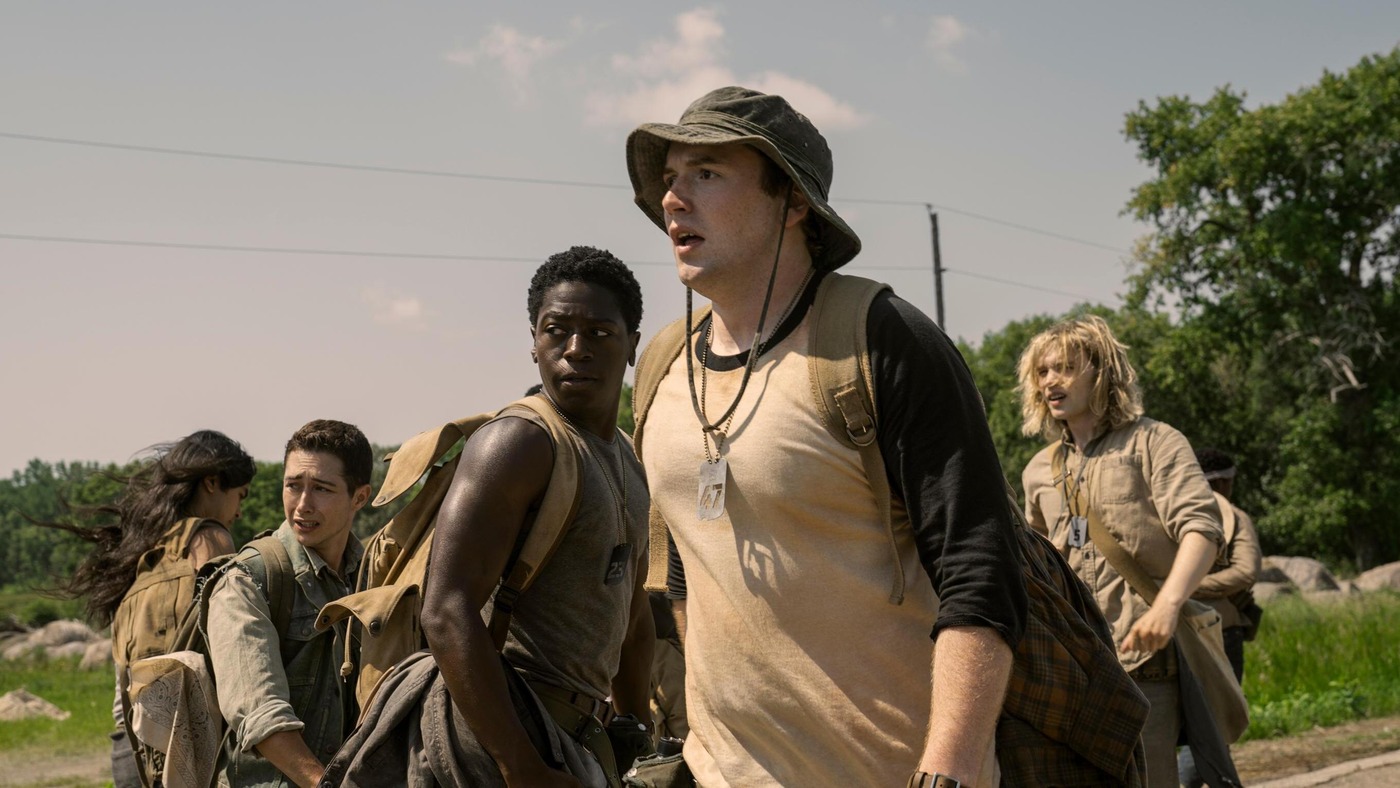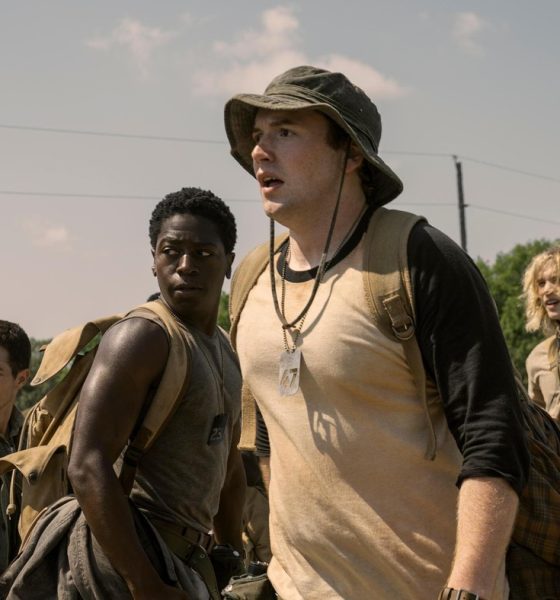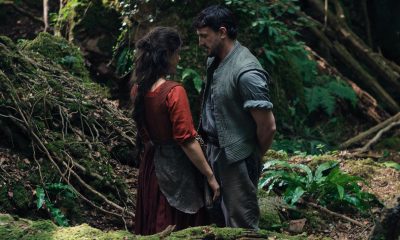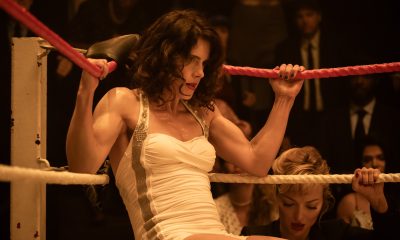

Featured Review
The Long Walk ★★★★
Release: 12 September 2025
Director: Francis Lawrence
Starring: Cooper Hoffman, David Jonsson, Garrett Wareing, Tut Nyuot, Charlie Plummer, Ben Wang, Jordan Gonzalez, Joshua Odjick, Roman Griffin Davis, Judy Greer & Mark Hamill
“Get busy living, or get busy dying” – it has been thirty-one years since those seminal words were first mentioned in Frank Darabont’s The Shawshank Redemption. Thirty-one years since banker Andy Dufresne (Tim Robbins) – in prison for a murder he didn’t commit – spoke to Red (Morgan Freeman) about Zihuatanejo, the dream place where he would escape to when he left the four walls of Shawshank. For audiences, it’s easy to identify the cynicism that resides within Red – institutionalised and worn down by the system, that eventually, you expect nothing less from life. But with a simple sentence, Andy showcases something that we naturally respond to as human beings: hope.
It’s hard not to look past those parallels when it comes to Francis Lawrence’s The Long Walk, the latest book-to-screen adaptations of Stephen King’s work. A film with all the hallmarks of a ‘Shawshank prison’ as 50 young men endure a death march across a dystopian rural-America until one is left standing. There are no pit-stops or rest breaks but the rules are simple: you walk or you die. Yet somehow, beneath the tyranny, the tragedy, and the psychological toll, is a profound sense of brotherhood and life-affirming resilience. Stephen King might be known as ‘The King of Horror’, but he is also the master of the human condition.
King’s work has always felt tailor made for the big screen. They connect on a deeper level, asking fundamental questions about our existence that go beyond the mystery, the supernatural and horror. As writers can relate, it doesn’t come as a surprise King projected his own fears into his imagined worlds, teasing “what if?” narratives as the extraordinary intrudes into the ordinary. Here, The Long Walk has given way to a post-war military oppression and totalitarianism, voices that speak louder today than when King first wrote the novel in 1979 under the pseudonym Richard Bachman. This year alone, the fascination with his work continues with Mike Flanagan’s The Life of Chuck and Osgood Perkins’ The Monkey also making the jump from novel to screen.
It helps that The Long Walk plays to Lawrence’s strengths, having overseen the sequel entries of The Hunger Games franchise. It doesn’t quite have the same bite as The Hunger Games: Catching Fire for example, where it naturally expanded the world of Panem to dissect class, affluence and power. The worldbuilding within The Long Walk is subtle by comparison, but does just enough to paint a world ravaged by financial and economic despair, where competing is the only salvation to escape the hardship. Yet, it is an annual competition that is normalised, the prize is subjective (given the amount of people who die on the walk) and it’s all done for the sake of entertainment led by The Major in a Trumpian-like performance by the outstanding Mark Hamill (minus the draft-dodging bone spurs excuse).

There’s a cruel irony at the heart of The Long Walk, and those haunting images of a failed country serve in direct contrast with the contestants or ‘walkers’ as they are described. JT Mollner’s unflinching and brutal screenplay strikes a balance between the death of the American dream versus the walkers as they pass through town after town. Lawrence builds a presence that’s felt rather than engaged with, helped by Jo Willems’s cinematography and Jeremiah Fraites’s intense score. Oftentimes, Mollner’s screenplay leaves its audience with more questions than answers regarding the world itself. What caused the war? How did this competition come about? Why are only men participating in this lottery stakes of survival? Yet, it opts for a character-driven focus on the walkers themselves rather being sidetracked, and credit where it’s due on this occasion. Mollner could have easily updated the material to fit the story in the same reality TV-esque realm as Squid Game or The Traitors where characters are encouraged by their gamified surroundings to selfishly feed their own desires. But instead, he faithfully honours King’s novel, exploring the ties that bond the walkers together.
The camaraderie is one of the most rewarding elements of Lawrence’s film. With astute pacing and increased tension with each mile, it drives at the heart of its characters, examining the complexities behind their relationships and how they see the world. Centre to that conversation is Cooper Hoffman’s Ray Garraty who joins the walk to avenge their father’s death. He befriends Peter McVries (Alien Romulus’ David Jonsson), an empathetic talker whose charisma and “Musketeers”-like optimism inspires those around him, including the comedic banter from Olson (Karate Kid Legends’ Ben Wang) and the spiritualism of Art (Tut Nyuot).
What ultimately sells the film is when the walkers start receiving their “ticket”, dropping out of the race due to various extremes – leg cramps, broken ankles and internal bleeding, just to name a few. Lawrence’s direction ensures every character gets their moment to shine, even when they’re taunted by the Major’s ironic insults. But it is the manner of the deaths that is hard to take as Mollner’s script builds enough personality and characteristics with each character to grow attached to them – and that is despite whether you like them or not. You’re walking a mile in their shoes before you realise how precious their life is.
Cooper Hoffman shines as a rebellious strategiser and fighter against the oppressed system but Jonsson’s performance delivers a masterclass in soulful poignancy and hope. Just like Red in The Shawshank Redemption, it’s easy to view his character through cynical eyes, especially when the world around us seems to find new levels of mental capitulation and adversity. But Jonsson breathes life into a character choosing to ‘live in the moment’ instead of thinking about the finish line. Despite his troubled past, it’s both inspirational and moving that genuinely brings out the tears.
Not even its rushed ending takes away from its impact. It’s a simple story told well, and without Hoffman and Jonsson as its beating heart and anchor, Lawrence’s film wouldn’t have been so emotionally compelling as it is. It’s a standout performance by the young actors whose on-screen friendship epitomises everything that makes The Long Walk worth watching. It’s a gut-punching, ruthless and powerful piece of cinema, instantly making it one of the best Stephen King adaptations ever made.
-

 Interviews3 weeks ago
Interviews3 weeks agoUp Close with Frank Cappello
-

 News3 weeks ago
News3 weeks agoIris Prize LGBTQ+ Film Festival Launches 2025 Programme
-

 Interviews2 weeks ago
Interviews2 weeks agoInterview With Director Sophie Dupuis/Actor Felix Maritaud (Solo)
-

 Features4 weeks ago
Features4 weeks agoLondon Film Festival 2025 – Most Anticipated
-

 News1 week ago
News1 week agoBolton International Film Festival Set To Return For 9th Edition
-

 Interviews4 weeks ago
Interviews4 weeks agoUp Close with Anastasiia Lukinskaia
-

 Featured Review3 weeks ago
Featured Review3 weeks agoIslands ★★★★
-

 Movie Reviews2 weeks ago
Movie Reviews2 weeks agoQueen Of The Ring ★★★











